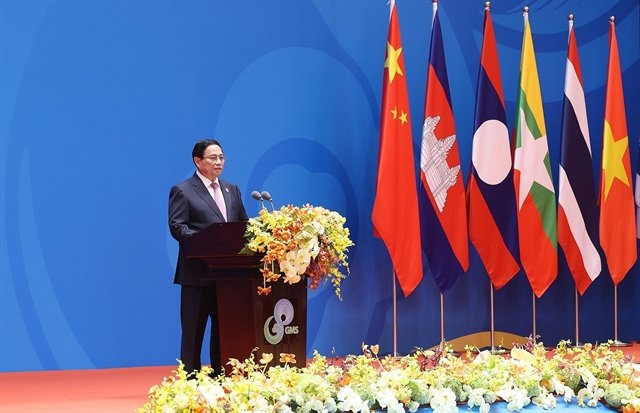November 8, 2024
KUNMING – Vietnamese Prime Minister Phạm Minh Chính joined leaders of Cambodia, Laos, Myanmar, Thailand and China as well as heads of the Asian Development Bank (ADB) and regional and international organisations at the eighth Greater Mekong Sub-region (GMS) Summit, which started in Kunming in China’s Yunnan Province on Thursday.
Looking back on the development of the GMS over the past 30 years, the leaders said they value the significant contributions of this cooperation mechanism, particularly in the areas of transport infrastructure, energy, telecommunications and enhancing industrial and agricultural production capacities.
Over 12,500km of roads and 1,000km of railways have been constructed, while nearly 3,000MW of electricity has been generated and more than 2,600km of power transmission lines have been built, helping to provide electricity to over 165,000 households. Since 2021, the GMS has mobilised nearly US$133 billion to implement more than 500 development projects in the sub-region.
The North-South and East-West Economic Corridors have truly become models of cross-border economic cooperation and connectivity, contributing to the promotion of regional trade and investment, and linking remote areas with seaports, airports and major economic centres.
With a deep understanding of the wide-ranging and multi-dimensional impacts of the technological revolution, the eighth GMS Summit has chosen the theme ‘Towards a Better Community through Innovation-driven Development’.
Opening the summit, Chinese Premier Li Qiang emphasised that innovation is a key driver of economic growth. He expressed China’s willingness to share innovation outcomes, promote the connection of hard and soft infrastructure and enhance sub-regional links through policy coordination, standard harmonisation, people-to-people exchanges and facilitating mobility. He also committed to offering multi-entry, five-year Mekong-Lancang visas for businesses and experts from member countries.
The participating leaders stressed the need to strengthen cooperation to harness remarkable advancements in science and technology for green transition and digital transformation in the Mekong sub-region. They agreed to establish a GMS Innovation System with the three key pillars of digitalisation, green transition and connectivity.
At the summit, the Vietnamese Government leader highlighted the lessons drawn in the 32 years of GMS cooperation and appropriate directions for the mechanism in this new development period. PM Chính also underlined its strategic role in the sub-region’s international integration and development, along with five valuable lessons learnt from its success.
The first lies with conducting equal, widespread consultations, and strengthening consensus among members for shared benefits, while the second is developing result-oriented cooperation strategies and programmes that align with the real needs of each country and the sub-region.
Putting people at the centre of cooperation and promoting economic connectivity in tandem with environmental protection form the third lesson.
The fourth lesson is to combine each member’s efforts with the support of the ADB and development partners, and the fifth lesson is turning challenges into motivation for progress.
When facing challenges, more effort, determination and solidarity are required to build a collective strength that drives cooperation and development forward, he stressed.
PM Chính emphasised that as it evolves and develops, the GMS must continually innovate, keep pace with global trends and meet the development demand of the sub-region.
With this mindset, he suggested that it is time for the GMS to focus on developing new-generation economic corridors centred on innovation, going beyond the traditional economic corridor model.

Prime Minister Phạm Minh Chính addresses the 8th Greater Mekong Sub-region Summit in Kunming City on Thursday. PHOTO: VNA/VNS/VIET NAM NEWS
He proposed three key components of these new-generation economic corridors:
Firstly, a corridor of technology and innovation should be built to foster multi-stakeholder, multi-sector and multi-phase connectivity, focusing on supporting countries in addressing gaps in institutional frameworks, policies, technological capacity and innovation resources, including human and financial resources.
Secondly, an economic growth corridor will revitalise traditional growth drivers while also fostering new ones.
Alongside infrastructure projects in transport, industrial production and agriculture, the GMS should expand investments to create corridors in semiconductors, artificial intelligence, new materials and clean energy, the PM noted, adding that it should also build digital platforms, broaden the digital market and improve digital skills for businesses and labourers. Chính also said that a substantial and effective transformation is needed to facilitate the smooth flow of capital, goods and services within the GMS region.
Thirdly, the corridor should be green, sustainable and inclusive, ensuring a balance between economic growth and environmental protection, with people put at the centre and being both the subject and the driving force of development. The GMS should further strengthen cooperation programmes on the environment and ecosystems, disaster management and climate change response. It should also place a particular emphasis on collaborating with the Mekong River Commission in managing and using the shared Mekong-Lancang river system in an effective, sustainable and equitable manner, while promoting the application of technology in integrated transboundary water resources management, Chính stated.
The Vietnamese Government leader emphasised the need for GMS members to stay united and coordinate in responding to challenges. He expressed his confidence that with the perspective of “valuing time, valuing intellect, innovating to break through, creating to reach further, integrating to move forward and uniting for greater strength”, this summit will contribute to realising the vision and goals of the GMS.
Vệt Nam will continue to work closely with member countries and development partners to jointly build a GMS that is innovative, dynamic and has sustainable and prosperous development, he added.
GMS members adopted the Joint Statement and the GMS Innovation Strategy for Development 2030. They also noted six documents related to climate and the environment, digitisation, investment, gender equality, health care and the digitalisation of trade documents, which will be implemented in the near future.
Earlier, within the framework of GMS cooperation, a forum of governors and mayors of provinces and cities along the Economic Corridor took place Wednesday. This event, initiated by China and held regularly in Kunming, aims to promote long-term and stable exchanges and cooperation between local governments and businesses from the six GMS member countries.


